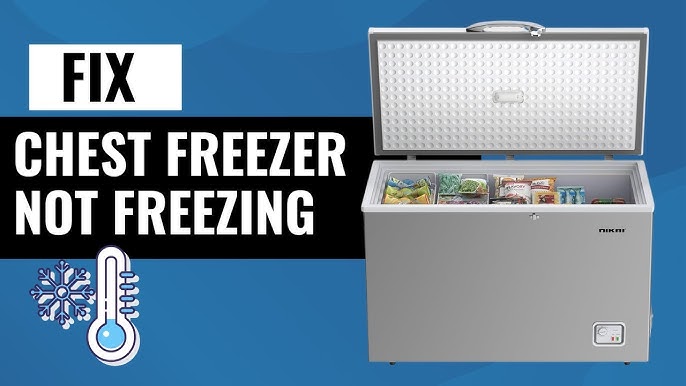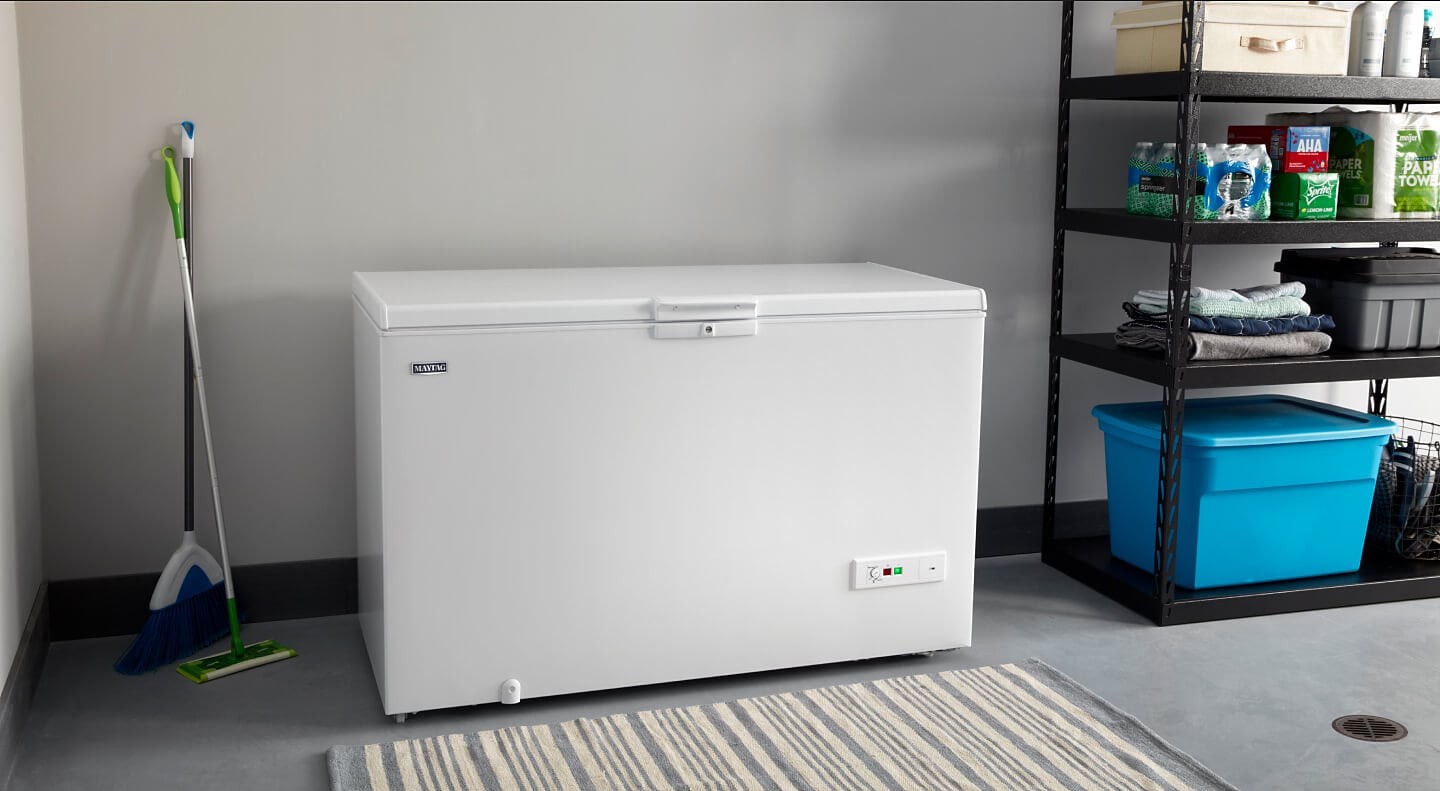Is your chest freezer leaving your ice cream a soupy mess instead of a frosty treat? If you’ve noticed that your trusty appliance isn’t keeping things as cold as it should, you’re not alone.
A chest freezer that’s not freezing can be a real headache, especially when you rely on it to preserve your food and keep your meals fresh. But don’t worry, we’re here to help you figure out what’s gone wrong and how to fix it.
Imagine the relief of opening your freezer and finding everything perfectly frozen, just like it should be. In this guide, we’ll walk you through simple troubleshooting steps to get your chest freezer back in action. You’ll discover common issues that might be causing the problem, and more importantly, learn how you can tackle them yourself. With just a little bit of effort, you can save time, money, and the frustration of dealing with spoiled food. So, if you’re ready to dive into a straightforward solution to your freezer woes, keep reading. You’ll be one step closer to restoring the chill and ensuring your freezer runs smoothly, keeping your food as fresh as the day you stored it.

Credit: www.youtube.com
Common Causes
Chest freezers are essential for preserving food items. But sometimes, they stop freezing. Understanding the common causes can help you troubleshoot and fix the issue.
Power Supply Issues
A faulty power source can prevent your freezer from freezing. Check if the power cord is plugged in properly. Inspect the outlet and ensure it’s working correctly. Consider resetting the circuit breaker. A stable power supply is crucial for optimal performance.
Thermostat Malfunctions
The thermostat regulates the freezer’s temperature. If it’s malfunctioning, the freezer won’t freeze. Verify the thermostat settings. Adjust them to ensure they’re set correctly. If problems persist, the thermostat may need replacement. A working thermostat is vital for proper freezing.
Blocked Airflow
Blocked airflow can hinder freezing capabilities. Ensure vents inside the freezer are not obstructed. Rearrange items to allow proper air circulation. Excessive frost can block vents. Regularly defrost the freezer to maintain efficient airflow.

Credit: www.youtube.com
Initial Checks
When your chest freezer stops freezing, it can be a real headache. But before panicking, try some initial checks. These steps can often solve the problem. Let’s dive into the basic troubleshooting tasks.
Inspect Power Cord And Outlet
First, check the power cord for any visible damage. Frayed or broken cords can disrupt power. Ensure the cord is securely plugged into the outlet. Sometimes, a loose connection can cause issues. Try plugging the freezer into a different outlet. This will rule out outlet problems. Remember, a working outlet is crucial for your freezer.
Verify Thermostat Settings
Next, take a look at the thermostat settings. They may have been changed accidentally. Make sure the thermostat is set to the correct temperature. A setting too high can prevent freezing. Adjust the thermostat to a colder setting. Wait a few hours and see if freezing resumes. Proper temperature settings are key for optimal performance.
Check For Frost Build-up
Frost build-up can obstruct the freezer’s function. Open the freezer and inspect the interior walls. Excessive frost can block airflow. This reduces the freezer’s efficiency. If you notice frost, it’s time to defrost. Unplug the freezer and let the frost melt away. Once clear, plug it back in and monitor the freezing. Regular defrosting helps maintain freezer efficiency.
Simple Fixes
Experiencing issues with your chest freezer not freezing? Check the thermostat settings and ensure it’s set correctly. Inspect the door seal for any gaps that might let warm air in. Regular maintenance can prevent these simple problems, ensuring your freezer works efficiently.
If your chest freezer isn’t freezing as it should, don’t worry—there are simple fixes you can try before calling a professional. Often, the solution is right at your fingertips. Tackling minor issues can save you time and money, and it could be as easy as adjusting a setting or reorganizing the contents. Dive into these straightforward solutions and get your freezer back on track.Defrost The Freezer
Ice buildup can be a sneaky culprit behind your freezer’s poor performance. When ice accumulates, it obstructs airflow and insulates the cooling coils, reducing efficiency. Defrosting is a straightforward fix. Start by unplugging the freezer and removing all contents. Place towels around the base to catch melting ice. Once defrosted, wipe down the interior, ensuring it’s dry before plugging it back in. This simple step often revitalizes the freezer’s functionality.Adjust Thermostat Settings
Incorrect thermostat settings could be the reason your freezer isn’t freezing properly. Consider the last time you adjusted the temperature—was it during a hot summer? Check your freezer’s thermostat dial. Make sure it’s set to the recommended setting, often between -0.4°F to -4°F (-18°C to -20°C). If you’ve recently added a lot of items, your freezer might need a colder setting temporarily to compensate.Reorganize Contents For Better Airflow
The way you organize your freezer can significantly impact its performance. If it’s packed tightly, cold air cannot circulate properly. Have you ever played Tetris with freezer items, trying to fit everything in? Ensure there’s space between items. Use baskets or bins to keep things organized and allow air to move freely. Remove any items you don’t use often. This simple reorganization can improve your freezer’s efficiency dramatically. Are you ready to tackle these fixes? Your chest freezer might just need a little TLC to return to optimal freezing conditions. Try these steps and see the difference for yourself.Component Troubleshooting
A chest freezer not freezing can cause stress. But often, the issue lies within its components. Troubleshooting these parts can solve the problem quickly. It also saves you from unnecessary replacements.
Focus on key areas like the compressor, evaporator fan, and condenser coils. Each plays a vital role in your freezer’s cooling performance.
Testing The Compressor
The compressor is the heart of the freezer. It pumps refrigerant through the system. A faulty compressor can stop the freezer from cooling. Listen for any unusual noises. If it hums loudly or clicks, it may need attention.
Check the power supply to the compressor. Ensure connections are secure. If the compressor remains silent, it might need replacement.
Evaluating The Evaporator Fan
The evaporator fan circulates cold air inside the freezer. Its failure can cause uneven temperatures. Open the freezer door and listen. If the fan does not run, inspect it.
Check for obstructions around the fan blades. Ensure they spin freely. Replace the fan if it remains unresponsive.
Assessing The Condenser Coils
Condenser coils release heat from the refrigerant. Dirty coils reduce cooling efficiency. Locate the coils, often found at the back or bottom.
Inspect them for dirt and dust buildup. Clean the coils gently with a vacuum or brush. This can improve the freezer’s performance.
When To Call A Professional
Experiencing issues with your chest freezer not freezing can be frustrating. It’s time to call a professional if basic troubleshooting doesn’t fix the problem. Unusual noises, persistent temperature fluctuations, or electrical issues signal the need for expert assistance.
When your chest freezer stops freezing, it’s frustrating. Fixing the problem yourself is often possible. But sometimes, you need a professional. How do you decide? Let’s explore some key points.Identifying Persistent Issues
Some problems keep coming back. Your freezer might not cool properly. You might hear strange noises. Ice might build up too fast. If these issues persist, it may be time to call a professional. They have the right tools. They know the signs of deeper problems.Understanding Warranty Coverage
Check your freezer’s warranty. Many come with coverage for repairs. If it’s still valid, you can save money. A professional repair might be covered. Read the warranty details carefully. Understand what repairs are included. This can guide your decision to call a professional. Recognizing when to call for help is crucial. It ensures your freezer runs efficiently. And it saves you from costly mistakes.Preventive Maintenance Tips
Keeping your chest freezer in top shape requires consistent care. Regular maintenance can prevent freezing issues and prolong its lifespan. Simple habits and checks ensure smooth operation and efficiency. Explore these preventive maintenance tips to keep your freezer running optimally.
Regular Cleaning Schedule
Cleaning your chest freezer regularly is essential. Dust and debris can block airflow and affect performance. Use a soft cloth to wipe the exterior weekly. Clean the interior monthly to prevent frost buildup. Unplug the freezer before cleaning. Remove all food items. Use a mixture of water and mild detergent to clean surfaces. Rinse with a damp cloth and dry thoroughly.
Proper Loading Techniques
Loading your freezer correctly can enhance its efficiency. Avoid overloading, as this restricts airflow. Arrange items systematically, leaving space for air circulation. Use baskets or bins for organization. Keep the heaviest items at the bottom. This ensures uniform cooling and easy access.
Routine Thermostat Checks
Check the thermostat settings regularly. Incorrect settings can cause freezing issues. Ensure the thermostat is set to the manufacturer’s recommended level. Use a separate thermometer to verify internal temperature. Adjust as needed to maintain optimal freezing conditions. Check for any signs of malfunction or wear.

Credit: www.maytag.com
Frequently Asked Questions
Why Is My Chest Freezer Not Freezing?
Check the thermostat setting. Ensure it’s set to a cold temperature. Also, inspect the door seal.
Can A Faulty Compressor Cause Freezing Issues?
Yes. A faulty compressor can prevent proper cooling. It may require professional repair or replacement.
What If The Freezer Is Overfilled?
Overfilling blocks air circulation. This can reduce cooling efficiency. Organize items to allow airflow.
Does Dirty Coils Affect Freezer Performance?
Yes. Dirty coils can hinder cooling. Clean them regularly to maintain efficient freezer operation.
How Can I Test The Freezer Door Seal?
Use a dollar bill. Close it in the door. If it slips out easily, the seal may be faulty.
Conclusion
Fixing a chest freezer can feel overwhelming. But, understanding the basic issues helps. Many problems have simple solutions. Always check the power source first. Next, examine the thermostat settings. Clean the coils regularly. This prevents overheating. Look for any blockages or ice buildup.
These can affect cooling. Call a professional if problems persist. Regular maintenance keeps your freezer running smoothly. A well-functioning freezer saves money and food. It’s worth the effort to troubleshoot. Keep these tips handy for future issues. Your food will stay fresh and safe.
